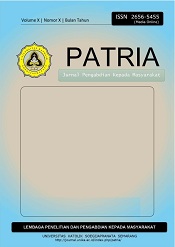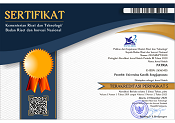Focus and Scope
Patria : Jurnal Pengabdian Kepada Masyarakat diterbitkan oleh LPPM (Lembaga Penelitian dan Pengabdian pada Masyarakat) Universitas Katolik Soegijapranata memuat berbagai artikel ilmiah yang menyajikan implementasi berbagai disiplin ilmu yang bersinergi dengan masyarakat untuk membantu menyelesaikan permasalahan yang ada dan memberikan pelayanan pada masyarakat. Sesuai namanya, PATRIA adalah bangsa, dalam hal ini Jurnal ini berkeinginan memberikan wadah untuk tulisan-tulisan yang berkontribusi dalam memberikan pelayanan pengabdian bagi bangsa Indonesia. Tulisan dalam jurnal ini untuk diseminasi gagasan dan hasil penellitian yang dapat diterapkan dalam masyarakat untuk kemudian mampu meningkatkan kesejahteraan masyarakat. Tujuan Jurnal Patria ini adalah membantu menyebarluaskan berbagai aktifitas dan kegiatan pengabdian masyarakat dari berbagai ide, pikiran, maupun integrasi dari berbagai disiplin ilmu. Jurnal ini terbit dua kali dalam setahun yakni Desember dan Juni.
Patria : Jurnal Pengabdian Kepada Masyarakat is a Community Service Journal published by LPPM (Institute for Research and Community Service) of Soegijapranata Catholic University. It publishes academic articles on the implementation of various disciplines that synergize with the community in solving problems and providing services to the community. As the name implies, PATRIA means nation, thus this journal is to provide a forum for articles that contribute to providing community services and improving the welfare of the Indonesian community. The aim of Patria Journal is to help disseminate various activities, ideas, and thoughts of community service from various disciplines. This journal is published twice in a year, December and June.
Section Policies
Articles
Peer Review Process
Seluruh paper yang terbit harus melalui proses review oleh para peneliti yang memiliki pengalaman di bidangnya. Proses review dilakukan oleh dua orang yang tidak dikenal oleh penulis paper. Paper yang dikirim ke reviewer akan diriview secara individual dan hasilnya akan dikirim ke editor. Rekomendasi dari reviewer dapat dalam bentuk diterima, diterima dengan perbaikan, atau ditolak. Untuk paper yang telah direvisi akan dikirim kembali kepada reviewer yang sebelumnya telah mereview papaer tersebut. Selanjutnya, seluruh paper yang telah diterima akan diseleksi oleh penyunting pelaksana untuk diterbitkan.
Each manuscript is firstly blind reviewed by at least two peer reviewers. By being blind reviewed, the reviewers do not know who is being partnered by whom and who the author of the manuscript is from as no names will be mentioned. If both reviewers accept the author's manuscript then the journal staff will process it further to be included in the list of manuscripts for publication. If one of the reviewer decides not to accept it, then the staff journal will find another reviewer to evaluate it. If the new reviewer also decides not to accept the manuscript then the journal staff has the right to send a letter of rejection to the author of the manuscript.
Open Access Policy
This journal provides immediate open access to its content on the principle that making research freely available to the public supports a greater global exchange of knowledge.
Archiving
This journal utilizes the LOCKSS system to create a distributed archiving system among participating libraries and permits those libraries to create permanent archives of the journal for purposes of preservation and restoration. More...
Ethics Statement
Our ethic statements are based on COPE’s Best Practice Guidelines for Journal Editors.
Publication decisions
The editor is responsible for deciding which of the articles submitted to the journal should be published.
The editor may be guided by the policies of the journal's editorial board and constrained by such legal requirements as shall then be in force regarding libel, copyright infringement and plagiarism. The editor may confer with other editors or reviewers in making this decision.
Fair play
An editor at any time evaluate manuscripts for their intellectual content without regard to race, gender, sexual orientation, religious belief, ethnic origin, citizenship, or political philosophy of the authors.
Confidentiality
The editor and any editorial staff must not disclose any information about a submitted manuscript to anyone other than the corresponding author, reviewers, potential reviewers, other editorial advisers, and the publisher, as appropriate.
Disclosure and conflicts of interest
Unpublished materials disclosed in a submitted manuscript must not be used in an editor's own research without the express written consent of the author.
Duties of Reviewers
Contribution to Editorial Decisions
Peer review assists the editor in making editorial decisions and through the editorial communications with the author may also assist the author in improving the paper.
Promptness
Any selected referee who feels unqualified to review the research reported in a manuscript or knows that its prompt review will be impossible should notify the editor and excuse himself from the review process.
Confidentiality
Any manuscripts received for review must be treated as confidential documents. They must not be shown to or discussed with others except as authorized by the editor.
Standards of Objectivity
Reviews should be conducted objectively. Personal criticism of the author is inappropriate. Referees should express their views clearly with supporting arguments.
Acknowledgement of Sources
Reviewers should identify relevant published work that has not been cited by the authors. Any statement that an observation, derivation, or argument had been previously reported should be accompanied by the relevant citation. A reviewer should also call to the editor's attention any substantial similarity or overlap between the manuscript under consideration and any other published paper of which they have personal knowledge.
Disclosure and Conflict of Interest
Privileged information or ideas obtained through peer review must be kept confidential and not used for personal advantage. Reviewers should not consider manuscripts in which they have conflicts of interest resulting from competitive, collaborative, or other relationships or connections with any of the authors, companies, or institutions connected to the papers.
Duties of Authors
Reporting standards
Authors of reports of original research should present an accurate account of the work performed as well as an objective discussion of its significance. Underlying data should be represented accurately in the paper. A paper should contain sufficient detail and references to permit others to replicate the work. Fraudulent or knowingly inaccurate statements constitute unethical behavior and are unacceptable.
Originality and Plagiarism
The authors should ensure that they have written entirely original works, and if the authors have used the work and/or words of others that this has been appropriately cited or quoted.
Multiple, Redundant or Concurrent Publication
An author should not in general publish manuscripts describing essentially the same research in more than one journal or primary publication. Submitting the same manuscript to more than one journal concurrently constitutes unethical publishing behaviour and is unacceptable.
Acknowledgement of Sources
Proper acknowledgment of the work of others must always be given. Authors should cite publications that have been influential in determining the nature of the reported work.
Authorship of the Paper
Authorship should be limited to those who have made a significant contribution to the conception, design, execution, or interpretation of the reported study. All those who have made significant contributions should be listed as co-authors. Where there are others who have participated in certain substantive aspects of the research project, they should be acknowledged or listed as contributors.The corresponding author should ensure that all appropriate co-authors and no inappropriate co-authors are included on the paper, and that all co-authors have seen and approved the final version of the paper and have agreed to its submission for publication.
Disclosure and Conflicts of Interest
All authors should disclose in their manuscript any financial or other substantive conflict of interest that might be construed to influence the results or interpretation of their manuscript. All sources of financial support for the project should be disclosed.
Fundamental errors in published works
When an author discovers a significant error or inaccuracy in his/her own published work, it is the author’s obligation to promptly notify the journal editor or publisher and cooperate with the editor to retract or correct the paper.







